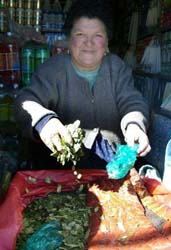Narcotics Control Board Destroying Coca Cultures
05 MARCH 2008
- |
|

|
Report Criticizes Governments Over Consumption of Coca Leaf
In a culturally insensitive and irrational move, the International Narcotics Control Board (INCB) has called for the governments of Bolivia and Peru to abolish all uses of the coca leaf, including coca leaf chewing.
In its 2007 annual report, the INCB asks Bolivia and Peru to make possessing and using coca leaf criminal offenses--a move that would affect millions of people in the Andes and Amazon, according to the Transnational Institute (TNI), a group that studies drugs and conflict in the region.
Coca leaf is widely consumed in both countries, both as a part of daily life and in indigenous religious ceremonies. The leaves have a mild stimulant effect similar to coffee. In the above places, there is no abuse of the plant whatsoever; the abuse happens when it is extracted and made into cocaine; a phenomena that swept the USA, but has never been practiced in cultures that use the coca leaf like coffee.
Despite the leaves' mild effect, the United Nations (UN) classifies them in the same category--Schedule I--as cocaine and heroin. This designation was made in 1961 based on a flawed study described by Martin Jelsma, coordinator of the drugs program at TNI, as "inspired by colonial and racist sentiments rather than science."
The INCB is a UN monitoring body that oversees the implementation of the UN drug control conventions. It is heavily influenced by the United States when making and suggesting policy.
|
|
|
|
|
Related
Articles :
- Ayahuasca, shamanism, and curanderismo in the Andes ()
The term ayahuasca comes from the Quechua, meaning literally "the vine of souls," although it is also called "the visionary vine" or the "vine of death." The folk term refers to the botanical species of liana known as Banisteriopsis Caapi , which is also known as Yage among the Indians of Brazil.
- Anti-Drug Gains in Colombia Don't Reduce Flow to U.S. (28 April 2005)
Five years and $3 billion into the most aggressive counternarcotics operation ever here, American and Colombian officials say they have eradicated a record-breaking million acres of coca plants, yet cocaine remains as available as ever on American streets, perhaps more so.
- Plants as Teachers Among 4 Mestizo Shamans of Iquitos, Peru ()
In the city of Iquitos and its vicinity there is even today a rich tradition of folk medicine. Practitioners, some of whom qualify as shamans, make an important contribution to the psychosomatic health of the inhabitants of this area.
- The Drug War Is The Inquisition (01 November 2001)
Racism, of course, was originally a form of anti-tribalism, driven by the economic value of enslavement. We are no longer overtly racist, in our public laws at least, but we are still politically driven by industrial power centers, still brutally anti-tribal, structurally violent, to millions of our children, our tribal primitives, and to our shamanic adults. Our contemporary slaver war, our Drug War, is a direct descendant, via the Inquisition, of Roman slave law, called Prohibitio by the Romans, Prohibition.
|
|
Email
This Article To A Friend - Print
This Article
Articles
can be E-mailed to a friend and you can get a printable version
of the article
IMPORTANT: We provide all information for
educational purposes only, and endorse or recommend nothing
here.
A special thanks to
Keith for
all his support and insight. |
|
|
| |
|

